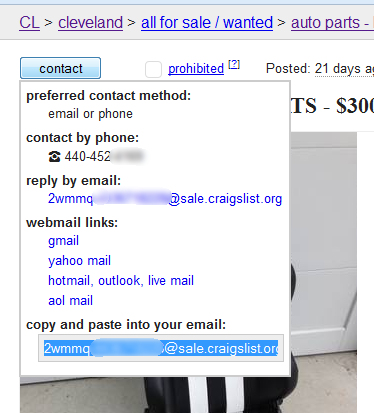If you post ads on Craigslist for short term employment, be aware that there's a new malspam campaign that aims to distribute Sigma ransomware on the computers of unwary users.
Craigslist provides a 'cover' email address that gets forwarded to the recipient's actual email address. Only Craigslist knows the real email addresses of both parties. This way, if one of the people involved turns out to be untrustworthy, they don't have the other person's email address. Decrypt Email Craigslist (or 'free Decrypt Email Craigslist downloads') is a program collection of 44 downloads, that can be described as: Decrypt Email Craigslist. Selection of software according to 'Craigslist email decrypt' topic. Automatically searches Craigslist for the items you want. Search any English Craigslist Orgs in the USA and Canada.
By all outward appearances, the emails seem to come from Craigslist in response to ads posted in Craigslist's 'Gigs' section for short term employment. The emails will generally express interest in whatever job the user has posted and include a protected Word or RTF document which recipients will assume are resumes.
If the recipient enters the password to unlock the document, they'll then be presented with a screen that asks them to enable the content in the document. Unfortunately, this is the step that dooms the user. The file isn't a resume at all, but merely a delivery vehicle.
As soon as the content is enabled, the ransomware will be installed, the user's files will be encrypted, and then will 'helpfully' post a message explaining that the files have been encrypted, and explaining that to get access to them again, they'll have to pay a $400 fee, which rises to $800 if the user waits longer than seven days to request the decryption key.

Unfortunately, there's no known way to decrypt Sigma-encrypted files other than paying the ransom.
This is a new twist on a very old game. Even worse, it's enjoying a relatively high success rate because people who post ads for short term employment on Craigslist expect to get responses from people they don't know. They expect that those people will be sending resumes for review.
The 'tell' is that when a potential employee sends you a resume, it's almost certainly not going to be password protected. In this case, your best bet would be to reply to the sending and ask them to send you a non-protected resume if they're genuinely interested in the job.
Decrypt Craigslist Email Address
If you post ads on Craigslist for short term employment, be aware that there's a new malspam campaign that aims to distribute Sigma ransomware on the computers of unwary users.
By all outward appearances, the emails seem to come from Craigslist in response to ads posted in Craigslist's 'Gigs' section for short term employment. The emails will generally express interest in whatever job the user has posted and include a protected Word or RTF document which recipients will assume are resumes.
If the recipient enters the password to unlock the document, they'll then be presented with a screen that asks them to enable the content in the document. Unfortunately, this is the step that dooms the user. The file isn't a resume at all, but merely a delivery vehicle.
As soon as the content is enabled, the ransomware will be installed, the user's files will be encrypted, and then will 'helpfully' post a message explaining that the files have been encrypted, and explaining that to get access to them again, they'll have to pay a $400 fee, which rises to $800 if the user waits longer than seven days to request the decryption key.

Decrypt File Tool
Unfortunately, there's no known way to decrypt Sigma-encrypted files other than paying the ransom.
Decrypt Craigslist Email Address
This is a new twist on a very old game. Even worse, it's enjoying a relatively high success rate because people who post ads for short term employment on Craigslist expect to get responses from people they don't know. They expect that those people will be sending resumes for review.
Decrypt Craigslist Email Login
The 'tell' is that when a potential employee sends you a resume, it's almost certainly not going to be password protected. In this case, your best bet would be to reply to the sending and ask them to send you a non-protected resume if they're genuinely interested in the job.
